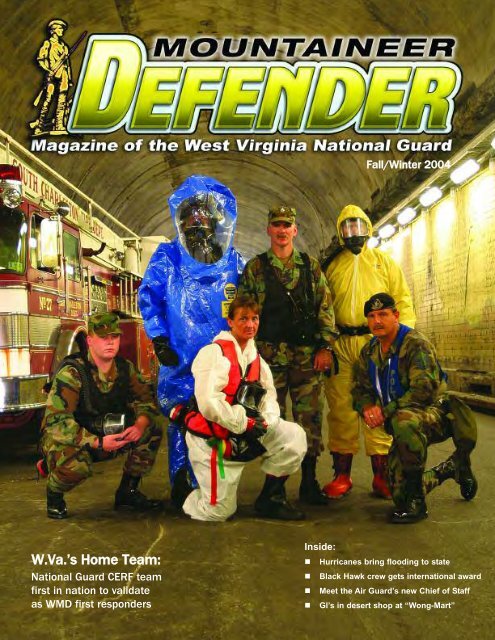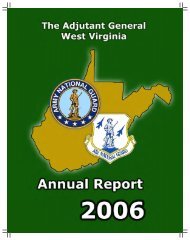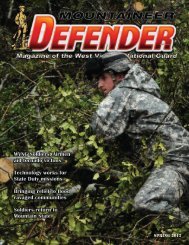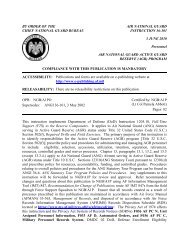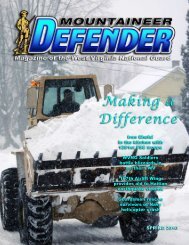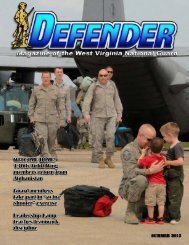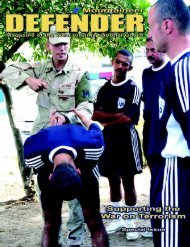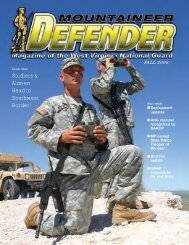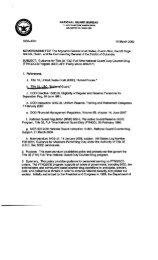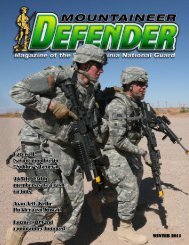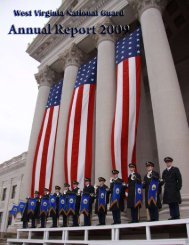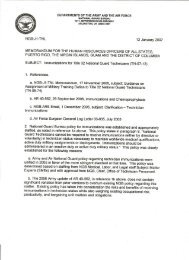04 Q4 Defender - West Virginia Army National Guard - U.S. Army
04 Q4 Defender - West Virginia Army National Guard - U.S. Army
04 Q4 Defender - West Virginia Army National Guard - U.S. Army
Create successful ePaper yourself
Turn your PDF publications into a flip-book with our unique Google optimized e-Paper software.
Fall/Winter 20<strong>04</strong><br />
W.Va.’s Home Team:<br />
<strong>National</strong> <strong>Guard</strong> CERF team<br />
first in nation to validate<br />
as WMD first responders<br />
Inside:<br />
• Hurricanes bring flooding to state<br />
• Black Hawk crew gets international award<br />
• Meet the Air <strong>Guard</strong>’s new Chief of Staff<br />
• GI’s in desert shop at “Wong-Mart”
Magazine of the<br />
<strong>West</strong> <strong>Virginia</strong> <strong>National</strong> <strong>Guard</strong><br />
Fall/Winter 20<strong>04</strong><br />
In this issue:<br />
• Command Messages 3<br />
• Cover story: 4<br />
WV CERF first to validate<br />
• Hurricanes ravage WV 6<br />
VA, KY support WV troops<br />
• Winning hearts and minds 7<br />
Generals have global impact<br />
• Black Hawk crew gets 10<br />
international award<br />
• Up-armor HUMVEEs 10<br />
3664th mission saves lives<br />
• It’s all relative in WV 11<br />
<strong>Guard</strong> is a family tradition<br />
• Home in the desert 12<br />
GI life at Camp Navstar<br />
• Iraqis get 201st kindness 12<br />
• “Wong-Mart” 13<br />
One-stop shopping<br />
for GIs serving in Iraq<br />
• Editorial: To the families 14<br />
• W.Va. Air <strong>Guard</strong><br />
gets new Chief of Staff 14<br />
• News you can use 15<br />
Page<br />
6<br />
Page<br />
12<br />
On the cover:<br />
WV CERF Team<br />
Read about it on Page 4<br />
Page<br />
10<br />
Page<br />
13<br />
W.Va. CERF team members take a break<br />
from training at the Center for <strong>National</strong><br />
Response (Memorial Tunnel). Pictured are:<br />
(Standing, left to right) Staff Sgt. Mark<br />
Wallace (CST-ARNG), Lt. Col. Larry<br />
Wheeler (ARNG), Commander, W.Va.<br />
CERF, and Spc. Ronald Payne. Kneeling<br />
are (left to right): Spc. Gabriel Boggs, Maj.<br />
Kim Sencindiver (ANG), and Master Sgt.<br />
Kevin Smith (ANG).<br />
Photo by Maj. Todd Harrell, 196th MPAD<br />
Adjutant General<br />
Maj. Gen. Allen E. Tackett<br />
State Command Sergeant Major<br />
Command Sgt. Maj. Bruce E. Coleman<br />
State Command<br />
Chief Master Sergeant<br />
Command Chief Master Sgt.<br />
Robert D. Chandler<br />
State Public Affairs Officer<br />
Maj. Mike Cadle<br />
Editor<br />
Joseph C. Atkins<br />
Graphics Editor<br />
Maj. Todd Harrell<br />
Editorial intern<br />
Cadet Ken Hammond<br />
The Mountaineer <strong>Defender</strong> is an<br />
authorized, unofficial publication<br />
of the <strong>West</strong> <strong>Virginia</strong> <strong>National</strong><br />
<strong>Guard</strong>. Contents are not necessarily<br />
the official views of, nor are<br />
they endorsed by, the U.S. government,<br />
the Department of<br />
Defense, the <strong>West</strong> <strong>Virginia</strong><br />
<strong>National</strong> <strong>Guard</strong> or the state of<br />
<strong>West</strong> <strong>Virginia</strong>. Publication of<br />
material is determined by available<br />
space and reader interest.<br />
The staff reserves the right to edit<br />
all material.<br />
Send comments/contributions to:<br />
State Public Affairs Office<br />
WV <strong>National</strong> <strong>Guard</strong><br />
1679 Coonskin Drive<br />
Charleston, WV 25311<br />
or<br />
defender@wvchar.ang.af.mil<br />
2<br />
M O U N T A I N E E R<br />
DEFENDER
Active duty troops praise<br />
WV <strong>Guard</strong>; family support<br />
is key to <strong>Guard</strong>’s success<br />
IHAD THE OPPORTUNITY to go to<br />
Iraq in September and visit <strong>West</strong> <strong>Virginia</strong><br />
<strong>Guard</strong> members serving alongside coalition<br />
forces in some of the most dangerous<br />
areas in the region. Words cannot express<br />
how proud I am of our soldiers and airmen.<br />
Everywhere I went<br />
commanding generals<br />
told me what a<br />
great job our people<br />
were doing escorting<br />
convoys, providing<br />
security and<br />
documenting all of<br />
our nation's military<br />
and humanitarian<br />
accomplishments.<br />
I am very proud<br />
that our soldiers are<br />
representing the state in such an outstanding<br />
manner, and I am equally proud of the work<br />
that is being done here in <strong>West</strong> <strong>Virginia</strong> to<br />
support those soldiers. I can tell you that the<br />
soldiers in Iraq were very pleased with the<br />
support from fellow soldiers and airmen left<br />
“I‘m asking every member of the<br />
<strong>West</strong> <strong>Virginia</strong> <strong>National</strong> <strong>Guard</strong> to get<br />
personally involved in solving any<br />
family problems as they occur. The<br />
best way to support our soldiers<br />
overseas is to support their families<br />
right here at home.”<br />
behind in <strong>West</strong> <strong>Virginia</strong>. Troops from other<br />
states are amazed that we continue to support<br />
deployed soldiers in such an outstanding<br />
manner, even though our members are on<br />
Title 10 and controlled by active duty forces.<br />
But the support for deployed troops is only<br />
part of the equation.<br />
We must also support<br />
families of deployed<br />
members.<br />
As I travel the state,<br />
I continue to hear<br />
from families about<br />
Tricare concerns,<br />
pay issues, and their<br />
problems contacting<br />
deployed soldiers in<br />
cases of family emergency.<br />
I am asking<br />
every member of the <strong>West</strong> <strong>Virginia</strong> <strong>National</strong><br />
<strong>Guard</strong> to get personally involved in solving<br />
any family problems as they occur. The best<br />
way to support our soldiers overseas is to<br />
support their families right here at home.<br />
The holidays have come and gone. Let’s be<br />
Maj. Gen. Allen E. Tackett<br />
<strong>West</strong> <strong>Virginia</strong> Adjutant General<br />
thankful for all we have. Our organization<br />
is strong, our soldiers are proud, and our<br />
families are behind us every step of the way.<br />
<strong>West</strong> <strong>Virginia</strong>'s <strong>National</strong> <strong>Guard</strong> is the best<br />
organization in the U.S. military. Together,<br />
we can overcome the challenges facing us in<br />
the coming year. May God bless our troops<br />
and families.<br />
Command Sergeant Major, WVARNG<br />
Proud of accomplishments<br />
IT IS TIME to close out<br />
TY<strong>04</strong>, a remarkable year, a<br />
year that will make history for<br />
the WVNG.<br />
We have deployed and redeployed<br />
many of our <strong>National</strong><br />
<strong>Guard</strong> members. We have<br />
fought floods and cared for the<br />
citizens of <strong>West</strong> <strong>Virginia</strong>.<br />
The accomplishments of our<br />
<strong>Guard</strong> members are too great<br />
in number and magnitude to list<br />
here. Yet, immediately we open<br />
TY05 knowing there is no relief<br />
in sight.<br />
We are successful because of<br />
the quality of people who serve!<br />
It is a time when every member,<br />
every family member, and every<br />
employer associated with the<br />
WVARNG should hold their<br />
heads high and be proud of their<br />
performance and sacrifices in<br />
this War on Terrorism.<br />
We must all remember those<br />
who are still in harms way and<br />
the anguish suffered by their<br />
loved ones. Keep them in your<br />
thoughts and<br />
prayers.<br />
Each of<br />
you has<br />
displayed<br />
personal<br />
patriotism<br />
and your<br />
dedication<br />
Bruce<br />
Coleman<br />
to our way<br />
of life.<br />
For that I<br />
thank you. My wife, Linda, and<br />
I are proud to call you our<br />
friends.<br />
We would like to send you<br />
all the best wishes for the<br />
coming year.<br />
Command Chief Master Sergeant, WVANG<br />
Thank those who serve<br />
MY EARLIEST memories<br />
of war are in December<br />
1951, when a young airborne<br />
soldier who lived across the road<br />
left home in his dress uniform<br />
with his duffle bag. I asked my<br />
Dad where the soldier was<br />
going. Dad said, “Korea.”<br />
That was 53 years ago. For<br />
half a century now, I’ve seen<br />
young people in uniform risk the<br />
ultimate sacrifice while serving.<br />
I’ve thought about those that<br />
went off to battle and never<br />
came home. I’m reminded of<br />
soldiers like Private 1 st Class<br />
Frank Jarrell of St. Albans, who<br />
lost his left arm in World War II,<br />
and the C-130 aircrew killed in<br />
Vietnam. Just a few weeks ago,<br />
we stood in formation as<br />
Maj. Gen. Tackett pinned Purple<br />
Heart medals on 167th Airlift<br />
Wing Staff<br />
Sgts. Derek<br />
Brown and<br />
Brad Runkles<br />
for injuries<br />
they received<br />
while in Iraq.<br />
More than<br />
80 million<br />
U.S. citizens<br />
Dan Chandler<br />
have served<br />
during our nation’s history.<br />
Today, America’s sons and<br />
daughters have helped liberate<br />
Iraq and Afghanistan and taken<br />
a stand against global terrorism.<br />
Please take time to thank those<br />
who serve for all they do for our<br />
great nation and the world. Also<br />
thank the family members for<br />
their support.<br />
I humbly thank each of you<br />
for wearing the uniform!<br />
FALL/WINTER 20<strong>04</strong><br />
3
Photo by Maj. Mike Cadle, HQ, WVANG<br />
CERF decontamination team members check a victim for chemical exposure<br />
during the unit's First <strong>Army</strong> Evaluation in August at <strong>West</strong>wood Middle School<br />
in <strong>West</strong>over, W.Va.<br />
4<br />
M O U N T A I N E E R<br />
DEFENDER<br />
DENSE FOG HUNG LOW over the<br />
grounds of <strong>West</strong>wood Middle School,<br />
obscuring bodies scattered around the<br />
school’s football stadium. Terrorists detonated a<br />
bomb containing a suspected nerve agent during<br />
a vice-presidential political rally at the<br />
school Aug. 5, wounding hundreds of attendees<br />
and straining the response capabilities of state<br />
and local first responders.<br />
<strong>West</strong> <strong>Virginia</strong>’s newly formed <strong>National</strong><br />
<strong>Guard</strong> weapons of mass destruction disasterresponse<br />
team swung into action, helping local<br />
emergency management agencies restore order<br />
and responding to victims’ cries for help.<br />
It was just an exercise, but these types of<br />
scenarios help U.S. <strong>Army</strong> officials evaluate the<br />
capabilities of the nation’s 12 newest WMD<br />
response teams, officially known as Chemical,<br />
Radiological, Nuclear or High-Yield Explosive<br />
Enhanced Response Force Package — CERFP.<br />
<strong>Army</strong> evaluators had high praise for <strong>West</strong><br />
<strong>Virginia</strong>’s team, calling it the “largest team<br />
effort we have seen in all our evaluations.”<br />
Inspectors rated the team “Green” — <strong>Army</strong><br />
code for mission ready — on 25 of 26 tasks, and<br />
the remaining task qualification can be achieved<br />
easily through additional training, according to<br />
Lt. Col. Larry Wheeler, the team’s commander.
By Maj. Mike Cadle<br />
HQ, <strong>West</strong> <strong>Virginia</strong> Air <strong>National</strong> <strong>Guard</strong><br />
Photo by Master Sgt. Sherry Claus, W.Va. CERF<br />
A CERF medic stores a backboard used to<br />
transport victims to a medical treatment area.<br />
CERFP was formed in March, drawing<br />
about 150 <strong>Army</strong> and Air <strong>Guard</strong> members<br />
from across <strong>West</strong> <strong>Virginia</strong>. Team members<br />
spent nearly every weekend and the two<br />
weeks before the evaluation honing their<br />
skills in four primary areas — command,<br />
search and extraction, decontamination and<br />
medical treatment.<br />
<strong>Army</strong> validation meant <strong>West</strong> <strong>Virginia</strong>’s<br />
CERFP was the first of 12 teams nationwide<br />
to be certified in all four response areas.<br />
Similar teams will be fielded by <strong>Guard</strong><br />
units in Massachusetts, Missouri, Texas,<br />
Pennsylvania, Florida, Colorado, California,<br />
New York, Illinois, Washington and Hawaii.<br />
Each of the 12 units is assigned to a Federal<br />
Emergency Management Agency region of<br />
the country. <strong>West</strong> <strong>Virginia</strong>’s CERFP will<br />
operate in FEMA Region III, responding to<br />
disasters in, <strong>Virginia</strong>, <strong>West</strong> <strong>Virginia</strong>, Delaware,<br />
Maryland, Pennsylvania and the District of<br />
Columbia.<br />
“The possibility of further attacks in the<br />
national capital region underscores the need<br />
for additional WMD response capabilities,”<br />
said Col. Bill Aldridge, chief of staff for joint<br />
<strong>Army</strong> and Air <strong>National</strong> <strong>Guard</strong> headquarters.<br />
“The <strong>Guard</strong> has to change to stay ahead of<br />
the nation’s enemies.”<br />
CERFP is not the only unit in the <strong>West</strong><br />
<strong>Virginia</strong> <strong>National</strong> <strong>Guard</strong> capable of combating<br />
terrorism. The state’s 22-person Civil Support<br />
Team was formed about three years ago,<br />
giving <strong>West</strong> <strong>Virginia</strong> its first military team<br />
dedicated solely to WMD response. The CST<br />
and CERFP will work hand-in-hand when<br />
responding to WMD events, as evidenced by<br />
the exercise at <strong>West</strong>wood Middle School.<br />
CST members were first on the scene,<br />
“assessing the situation, advising incident<br />
commanders and first responders, and assisting<br />
Photo by Maj. Mike Cadle, HQ, WVANG<br />
A First <strong>Army</strong> evaluator (center) watches closely<br />
as CERF decontamination team members check<br />
a victim for chemical contamination.<br />
them in bringing additional military and<br />
civilian assets to the incident,” said Lt. Col.<br />
Mike Kitts, commander of <strong>West</strong> <strong>Virginia</strong>’s<br />
CST at the time of the evaluation.<br />
Meanwhile, CERFP’s search and extraction<br />
team was removing victims from the stadium<br />
area to a triage station set up on the hillside<br />
overlooking the school. Volunteers from<br />
nonparticipating units portrayed — some quite<br />
realistically — the attack’s victims.<br />
“Please help me find my baby. I can’t find<br />
my baby,” one victim wailed, as rescuers led<br />
her to the triage point.<br />
“I can’t breathe. My chest hurts so bad,”<br />
gasped another victim.<br />
Maj. Kim Sencindiver, a nurse in the<br />
Martinsburg-based 167th Airlift Wing, worked<br />
triage, marking patients with color-coded tape<br />
to depict their medical condition — green<br />
meant the individual was walking wounded;<br />
yellow was for those whose wounds could<br />
wait; red meant victims needed immediate<br />
care; and black and white was for those with<br />
fatal wounds.<br />
Sencindiver said her priority was to get<br />
patients into decontamination and medical<br />
treatment processes as quickly as possible,<br />
while making those with fatal wounds “as<br />
comfortable as possible until the inevitable.”<br />
Victims were moved from triage into the<br />
decontamination tent, where clothes were<br />
cut off and shower facilities made available<br />
to those who could wash themselves.<br />
Nonambulatory patients going through<br />
decontamination on gurneys were scrubbed<br />
down by decon specialists in biohazard suits.<br />
After decontamination, victims were checked<br />
with handheld monitors to make sure all<br />
Please see CERFP, Page 6<br />
contamination was gone. Local ambulance<br />
5
CERFP (Continued from Page 4)<br />
services then transported victims to area<br />
hospitals for treatment.<br />
<strong>Guard</strong> leaders monitored the entire process<br />
closely, setting up a command tent about 50<br />
yards from the “hot zone,” while military police<br />
established a cordon around the area to prevent<br />
curious spectators from entering the area and<br />
also becoming contaminated.<br />
Wheeler said <strong>Guard</strong> leaders were there to<br />
support local officials. “Our command staff has<br />
to maintain communication with the on-scene<br />
commander in order to coordinate <strong>Guard</strong><br />
response,” he said. “[<strong>Guard</strong> members] bring<br />
specialized skills to the fight that may not be<br />
available with local or state resources.”<br />
With validation comes the possibility of<br />
deployments, according to Maj. Ron Garton,<br />
the CERFP public affairs officer. Garton said<br />
the team could be called upon to support<br />
events ranging from Bridge Day to the<br />
presidential inaugurations.<br />
Aldridge understands that deployments are<br />
inevitable, but says the <strong>West</strong> <strong>Virginia</strong> CERFP is<br />
ready. “We train so we can deploy,” Aldridge<br />
said, praising the efforts of the team. “This was<br />
a highly successful exercise that demonstrates<br />
the <strong>Guard</strong>’s ability to respond to terrorist incidents.<br />
“That should be great comfort to the<br />
citizens of <strong>West</strong> <strong>Virginia</strong>.”<br />
Hurricanes ravage W.Va.<br />
VA and KY <strong>Guard</strong>s help WV troops clean up after Ivan, Frances unleash floods<br />
By Staff Sgt. Cheryl Hackley<br />
<strong>National</strong> <strong>Guard</strong> Bureau<br />
Photo by Maj. Todd Harrell, 196th MPAD<br />
Wheeling Island Stadium was covered with several inches of mud<br />
and grime after heavy September rains caused the Ohio River to<br />
overflow its banks.<br />
WHEELING — Two weeks after Spc. Charles Robinson was<br />
sworn into the <strong>West</strong> <strong>Virginia</strong> <strong>Army</strong> <strong>National</strong> <strong>Guard</strong>, he was already<br />
serving on state active duty. While thousands of Florida <strong>National</strong><br />
<strong>Guard</strong>smen aided their state in cleaning up after Hurricanes<br />
Charley, Frances and Ivan, <strong>West</strong> <strong>Virginia</strong> activated troops for flood<br />
cleanup duty when Ivan and Frances caused severe storms that led<br />
to flooding in eight counties.<br />
“We’re bringing all the necessary supplies to the disaster areas,”<br />
Robinson, a truck driver, said during his flood duty. “We’ve got a<br />
lot of bleach, brooms, mops, water and buckets from the Federal<br />
Emergency Management Agency. All this is necessary to sanitize<br />
the flooded areas.”<br />
Across the counties, 1,500 soldiers and airmen from <strong>West</strong><br />
<strong>Virginia</strong> and Kentucky — who volunteered for this deployment —<br />
did their part. Jobs varied from picking up trash in front-end loaders,<br />
driving 5- and 10-ton trucks to landfills, repairing vehicles, distributing<br />
supplies, flying supplies and state officials to flood sites,<br />
and traffic control. <strong>Virginia</strong> also provided equipment, and<br />
Connecticut and Maryland offered to help, placing resources on<br />
stand-by in case they were needed.<br />
The devastation in Northern <strong>West</strong> <strong>Virginia</strong> was so bad because,<br />
while flooding of the Ohio River was anticipated, the tremendous<br />
amount of rainfall caused flash flooding in locations that were<br />
unprepared. Local officials called it the worst flood since the 1930s.<br />
Ohio County was hardest hit, and more than 300 soldiers were<br />
stationed there assisting in the cleanup. It also was the main distribution<br />
point for supplies to the other counties. Ohio County was<br />
where Robinson worked.<br />
“Every morning, there is a line of semi-trucks waiting to drop<br />
off more supplies,” he said. Supplies were hauled out to distribution<br />
sites almost as quickly as they arrived. FEMA paid for the landfill<br />
fees and the thousands of cleaning supplies the <strong>Guard</strong> distributed.<br />
On Wheeling Island, nearly every house’s front yard was<br />
stacked with debris for the troops to pick up and haul to landfills.<br />
“We really couldn’t do it without them,” Wheeling resident<br />
Joyce Piefer, who lives next to the river, said at the time. “We<br />
appreciate all they are doing, but I just don’t think there are enough<br />
of them for all the work that needs to be done.”<br />
The <strong>West</strong> <strong>Virginia</strong> <strong>National</strong> <strong>Guard</strong> is a strong, but small force. It<br />
has 6,200 soldiers and airmen, of which 1,300 are on federal active<br />
duty supporting the global war against terrorism. And much of the<br />
equipment they needed for cleanup efforts was kept in Iraq after the<br />
<strong>West</strong> <strong>Virginia</strong>ns returned from nearly a year and half there.<br />
<strong>West</strong> <strong>Virginia</strong> has activated 75 percent of its total force for state<br />
or federal duty. So the help from surrounding states was necessary<br />
to get the cleanup mission done.<br />
“They would have done the same for us,” added Sgt. Thomas<br />
Dalton, a Kentucky engineer. “Especially if a lot of our troops were<br />
deployed overseas like theirs are.”<br />
Robinson faced the possibility of dropping out of college for the<br />
fall semester because of the call-up, but he didn’t mind. “Folks<br />
have a real hard time recovering after something like this,” he said.<br />
“It’s important that I am here to do my part. You should see their<br />
face when we show up. It really makes me feel like a hero.”<br />
6<br />
M O U N T A I N E E R<br />
DEFENDER
Winning hearts and minds<br />
<strong>Army</strong> <strong>Guard</strong> commander says<br />
Korea still vital to U.S. interests<br />
By Joseph C. Atkins<br />
Mountaineer <strong>Defender</strong><br />
While most Americans focused<br />
in recent months on the Nov. 2<br />
presidential election and the fighting<br />
in the Middle East,<br />
Charleston's Brig. Gen. John E.<br />
Barnette flew to the Far East to<br />
practice warfighting against an old<br />
foe, North Korea.<br />
Barnette, commanding officer<br />
of the <strong>West</strong> <strong>Virginia</strong> <strong>Army</strong> <strong>National</strong><br />
<strong>Guard</strong>, is also the wartime assistant<br />
chief of staff for personnel, or G1,<br />
for the Eighth U.S. <strong>Army</strong>, the permanent<br />
American ground force<br />
facing North Korea.<br />
During a North Korean aggression<br />
against the South, Barnette<br />
would provide advice and guidance<br />
to Lt. Gen. Charles C.<br />
Campbell, Eighth <strong>Army</strong>'s commanding<br />
officer and deputy commander<br />
of U.S. Forces Korea, on<br />
all matters related to military and<br />
civilian personnel.<br />
Barnette, a 1969 <strong>West</strong> <strong>Virginia</strong><br />
State College graduate goes to the<br />
Korean Peninsula three times a<br />
year, usually for about three weeks<br />
each time, for all-service warfighting<br />
exercises. "We perform all the<br />
wartime functions of replacing<br />
troops, dealing with casualties,"<br />
Barnette said. "We practice in a<br />
wartime scenario. "If war would<br />
break out in Korea, I'd mobilize<br />
and assume G1 duties."<br />
These exercises are necessary<br />
because war has broken out before.<br />
North Korean tanks and troops<br />
invaded the Republic of Korea to<br />
the south on June 25, 1950. Thirtyseven<br />
bloody months later, an<br />
armistice was signed that ended the<br />
fighting, allowing most of the<br />
302,000 U.S. forces and roughly<br />
40,000 troops from the 16 other<br />
U.N. nations to go home.<br />
Today, about 37,000 Americans<br />
are part of the multinational U.N.<br />
Command of 700,000 forces facing<br />
a roughly equal number of communist<br />
forces above the 1953 ceasefire<br />
line, the 38th Parallel.<br />
Anyone who pays even a little<br />
attention to international news<br />
knows that, oftentimes, anarchist<br />
Brig. Gen. John E.<br />
Barnette<br />
elements in South Korea take to the<br />
streets of Seoul to protest the U.S.<br />
presence in that country and<br />
foment instability. Barnette said<br />
that public display of resentment<br />
does not extend into the South<br />
Korean military.<br />
"Our relationship with the<br />
Republic of Korea army is very<br />
good," he said. "They appreciate<br />
us, and our working relationship is<br />
excellent. They are motivated [to<br />
protect their national security]."<br />
And the United States still<br />
remains motivated to protecting<br />
South Korea from another communist<br />
invasion. With the Soviet<br />
Union now dead and al-Qaida and<br />
other terrorist groups making the<br />
headlines, it might seem oldschool,<br />
even quaint, to still be<br />
standing up against communism.<br />
But it's still there, and still a threat<br />
to world peace and U.S. national<br />
security.<br />
"We have a strategic interest in<br />
that part of the part of the world,"<br />
Barnette said. "It's vital to us to<br />
keep stability." As with all <strong>Guard</strong><br />
members, maintaining (or establishing)<br />
stability is what pulls<br />
Barnette away from civilian life.<br />
Today, the civilian Barnette<br />
owns Cornerstone Development,<br />
a consulting firm that provides<br />
training and counseling in strategic<br />
leadership.<br />
Judge/general uses civil affairs<br />
to help Horn of Africa Muslims<br />
By Joseph C. Atkins<br />
Mountaineer <strong>Defender</strong><br />
Fighting the war against Islamic<br />
terrorists is not limited to guns, grunts,<br />
pilots and bombs. Changing the way<br />
Muslims view Americans has its own<br />
importance.<br />
That’s where soldiers like Brig.<br />
Gen. W. Craig Broadwater come into<br />
play.<br />
Broadwater’s civilian uniform is<br />
the robe of U.S. district judge for<br />
Northern <strong>West</strong> <strong>Virginia</strong>. In his <strong>West</strong><br />
<strong>Virginia</strong> <strong>Army</strong> <strong>National</strong> <strong>Guard</strong> uniform,<br />
the 53-year-old <strong>West</strong> <strong>Virginia</strong><br />
University graduate is the state’s<br />
assistant adjutant general for installations<br />
and homeland security.<br />
In early March, he returned from<br />
more than a year’s deployment, mostly<br />
in the Horn of Africa, where his<br />
assignment with U.S. Central<br />
Command was dealing with pay and<br />
personnel records issues for mobilized<br />
reservists and <strong>Guard</strong>smen.<br />
But, as deputy commander of<br />
Combined Joint Task Force Horn of<br />
Africa, at Camp Lemonier, Djibouti,<br />
he also worked closely with the<br />
locals.<br />
“One of our missions was to make<br />
sure a more positive image of us was<br />
projected to the Islamic population in<br />
the Horn of Africa,” Broadwater said.<br />
“We renovated schools, medical clinics,<br />
[and provided] veterinary, medical<br />
and civil affairs programs, where<br />
we’d meet with people in villages.”<br />
Under the <strong>West</strong> <strong>Virginia</strong> general,<br />
soldiers sent from Special Operations<br />
Detachment Europe, provided these<br />
programs in Djibouti, Kenya and<br />
Ethiopia.<br />
“We were very proactive in putting<br />
the best foot forward for us,” he said.<br />
“They [the civil affair programs] were<br />
very well received.”<br />
Broadwater said the fondest memory<br />
of his long deployment was the<br />
camaraderie between GIs, Marines,<br />
airmen and sailors, including Navy<br />
SEALs.<br />
The Horn can be a dangerous<br />
place, especially for Americans.<br />
“It was designated as a combat<br />
zone,” Broadwater said. “The<br />
Marine Corps commander and I<br />
understood that transnational terrorist<br />
Brig. Gen. W. Craig<br />
Broadwater<br />
networks were operating in the area,<br />
so we took proactive responsibility<br />
for our own security.”<br />
Those terrorists were exactly the<br />
reason the Americans were deployed<br />
to that area.<br />
“What we were trying to do was<br />
prevent the re-emergence of Islamic<br />
radicals in the Horn of Africa — [to<br />
keep terrorists from] thinking they<br />
might find safe havens there,”<br />
Broadwater said.<br />
So the Americans worked hard to<br />
win the hearts and minds of the<br />
locals before Islamic terrorist propaganda<br />
and intimidation could contaminate<br />
them.<br />
“There were some indications that<br />
there were some emerging problems<br />
in the area,” Broadwater said.<br />
“Transnational networks looked like<br />
they were going to be starting in the<br />
area.”<br />
Part of that work was military-tomilitary<br />
training with African national<br />
forces, the general said, “To make<br />
sure they were able to head off their<br />
own homegrown terrorist problems.<br />
“Civil affairs gave us the opportunity<br />
to get our foot in door,” he added.<br />
“It was a significant part of what we<br />
were doing<br />
“No one questioned [whether you<br />
were] reservist or active duty, but<br />
whether you were up to the job,” the<br />
general said. “Everyone fully accepted<br />
you for what you were.”<br />
FALL/WINTER 20<strong>04</strong><br />
7
Photo by Chief Warrant Officer 3 Ronald Eagle, 201st FA<br />
(l to r) Staff Sgt. Darwin Stemple of Terra Alta, Spcs. Terry Srout of Purgitsville<br />
and Steven Parrish of Mannington, and Staff Sgt. Charles O’Brien of Terra Alta<br />
were presented Purple Heart medals at Camp Cedar for injuries sustained when<br />
the soldiers’ convoys were struck by improvised explosive devices.<br />
Photo by Chief Warrant Officer 3 Ronald Eagle, 201st FA<br />
Maj. Gen. Tackett talks with soldiers from Service Battery, 201st FA in<br />
the mess hall at Camp Cedar during his visit to Iraq in September.<br />
Standing are (l to r): Staff Sgt. Jackson Knotts of Tunnelton, Tackett,<br />
Staff Sgt. Donald Cathell of Rowlesburg and Sgt. Chris Cathell of<br />
Morgantown.<br />
Photo courtesy of Staff Sgt. Andrew Rouse<br />
Staff Sgt. Andrew Rouse, guidance and control systems specialist in the 130th<br />
Maintenance Squadron, stands at the ceremonial South Pole during a recent trip to<br />
Antarctica supporting Operation Deep Freeze.<br />
Maj. Gen. Tackett thanks soldie<br />
September. Maj. Jeff Perkins,<br />
Photo by 196th MPAD<br />
( l to r) Sgt. 1st Class Nancy McMillan, Spc. Sherree Casper and Capt. Paula<br />
Sydenstricker of the 196th MPAD celebrate Christmas in Tikrit, Iraq.<br />
M O U N T A I N E E R<br />
DEFENDER<br />
Reprinted courtesy of Charleston Magazine<br />
Brothers 1st. Lt. James Shy and Staff Sgt. James Shy of<br />
the 130th Airlift Wing were featured in the Winter edition<br />
of the Charleston magazine for their service in the War<br />
on Terrorism.
Photo courtesy of 146th Medical Co.<br />
Coalition soldiers remove the wounded from a medical evacuation flight provided by the<br />
146th Medical Company operating in Bosnia.<br />
Photo by 3664th MC<br />
rs of the 3664th Maintenance Company for their outstanding work during a command visit to Iraq in<br />
3664th commander, stands at Tackett's right at rear of vehicle.<br />
Reprinted courtesy of Charleston Gazette<br />
<strong>West</strong> <strong>Virginia</strong>'s newspapers have been quick to print<br />
articles detailing the accomplishments of <strong>National</strong><br />
<strong>Guard</strong> soldiers serving overseas. The Charleston<br />
Gazette printed this article from Capt. Max Wilkinson of<br />
the 1092nd Engineer Battalion.<br />
Photo by 3664th MC<br />
Master Sgt. Michael Lambert, Chief Warrant Officer 3 Donnie Grimmett<br />
and State Command Sgt. Maj. Bruce Coleman chat during Coleman's<br />
September trip to visit soldiers serving in Iraq.<br />
Photo by 196th MPAD<br />
Maj. Gen. Tackett and State Command Sgt. Maj. Coleman with members of the 196th MPAD in<br />
Tikrit, Iraq. Standing are (l to r): Sgt. Roland Walters, Capt. Paula Sydenstricker, Tackett,<br />
Master Sgt. Bob Powell, Coleman. Kneeling are (l to r): Spc. Sherree Casper and Sgt. 1st<br />
Class Chuck Joseph.<br />
FALL/WINTER 20<strong>04</strong>
Black Hawk crew gets international award<br />
By Cadet Ken Hammond<br />
1st Battalion, 150th Armor (Rear Det.)<br />
Photo by 3664th Maintenance Company<br />
Brig. Gen. Frank Grass, Deputy Director of <strong>Army</strong> <strong>National</strong> <strong>Guard</strong> with award<br />
recipients Chief Warrant Officers 3 Carlos Godbey and Robert McClure, Staff<br />
Sgt. Jonathan Burge and Sgt. 1st Class David Baldwin.<br />
The crew of a <strong>West</strong> <strong>Virginia</strong> <strong>Army</strong> <strong>National</strong> <strong>Guard</strong> Black Hawk<br />
helicopter received an international award for rescuing three people<br />
during devastating flooding that struck Lincoln County in 2003.<br />
“It was the first live hoist rescue we had ever done,” said Chief<br />
Warrant Officer 3 Carlos Godbey about the operation that won him<br />
and his crew from the 146th Medical Company of Parkersburg the<br />
William J. Kossler Award for excellence in helicopter aviation.<br />
Co-pilot Godbey, pilot Chief Warrant Officer 3 Robert McClure,<br />
medic Sgt. 1st Class David Baldwin and crew chief Sgt. John Burge<br />
rescued a woman and two children from a deuce-and-a-half trapped<br />
in the swollen Mud River during a nighttime rescue on Nov. 12, 2003.<br />
Hoist-rescue operations are inherently difficult. McClure said this<br />
November night was so dark that, even with night-vision goggles,<br />
they could hardly see the mostly submerged truck beneath them. The<br />
crew men wondered if, given the wind, water, power lines and trees<br />
as obstacles, the rescue should even be attempted.<br />
“Dropping the penetrator down to the truck was like threading a<br />
needle,” Godbey said, “so I left it up to my crew chief, Sgt. John<br />
Burge, to make the choice.”<br />
Burge’s choice was to go for it, and all three victims were pulled<br />
out of the raging water. Three men who also were trapped in the<br />
truck escaped using ropes to get to the river bank.<br />
The Kossler Award has been presented annually since 1951 for<br />
outstanding achievement with helicopters. Kossler was a U.S. Coast<br />
<strong>Guard</strong> aeronautical engineer and early advocate of helicopter use in<br />
the Coast <strong>Guard</strong>. Past recipients have ranged from British Airways<br />
for advancing helicopter use in commercial aviation in 1978, to<br />
Soviet military and civilian helicopter pilots during the Chernobyl<br />
nuclear disaster in 1986, to 101st Airborne crews in 2002 during<br />
Operation Anaconda in Afghanistan.<br />
“It really felt good to be recognized, with a great sense of accomplishment<br />
and pride,” Godbey said of the international recognition.<br />
Earlier this year, Black Hawk maker Sikorsky also honored the<br />
crew for its work that night.<br />
Add-on armor mission saves lives<br />
The A&A Platoon has completed over 1600 add-on armor kits in<br />
two locations, but the mission is not over yet. Another 200 kits are<br />
due in. It is the consensus of the platoon that if one life is saved, the<br />
effort and time spent are worthwhile, and seeing the results of attacks<br />
on some of the vehicles the unit is repairing gives the soldiers an<br />
indication that many lives have been saved.<br />
Photo by 3664th Maintenance Company<br />
3664th MC soldiers Sgt. Eric Layne and Spc. David Simmons prepare a vehicle<br />
to receive the add-on armor kit.<br />
FOB ROUGHRIDER, Iraq - For soldiers of the 3664th Maintenance<br />
Company the mission in Iraq is an important one. In addition to providing<br />
direct support level maintenance, the unit also installs add-on<br />
armor kits and air conditioning on HUMVEEs. These kits consist of<br />
doors, body panels, back plates and ballistic windows.<br />
The soldiers recognize the importance of their work as they repair<br />
vehicles shot and hit by improvised explosive devices (IED's).<br />
Photo by 3664th Maintenance Company<br />
3664th MC mission of retrofitting vehicles with add-on armor kits is<br />
saving lives. This HUMVEE detonated an improvised explosive device<br />
(IED) shattering the windows, but all passengers survived.<br />
10 M O U N T A I N E E R<br />
DEFENDER
It’s all relative in W.Va.<br />
Serving <strong>National</strong> <strong>Guard</strong> is<br />
a family tradition for many<br />
By Joseph C. Atkins<br />
Mountaineer <strong>Defender</strong><br />
Everyone in the service knows about the<br />
military "family." But in the <strong>National</strong> <strong>Guard</strong>,<br />
it's more than an institution of support for<br />
loved ones of deployed service members.<br />
Fathers and mothers, husbands and wives,<br />
brothers and sisters, sons and daughters,<br />
aunts and uncles and cousins serve together<br />
in the <strong>National</strong> <strong>Guard</strong>. Maj. Gen. Allen<br />
Tackett, <strong>West</strong> <strong>Virginia</strong>'s Adjutant General,<br />
said it usually happens like this: "If you<br />
have a family member come into the <strong>Guard</strong>,<br />
and they're happy, they encourage other<br />
members of the family to do the same."<br />
Most of the time, Tackett said, <strong>Guard</strong><br />
members are part of the community, and<br />
they're stationed where they live, so family<br />
members can witness firsthand whether the<br />
<strong>Guard</strong> member is putting them on or not.<br />
Tackett said he got in the <strong>Guard</strong> through<br />
one of his cousins. And sons often follow<br />
their fathers into the <strong>Guard</strong>. Tackett said it's<br />
just as natural to them as following their<br />
fathers into any other career field.<br />
"We have a lot of father-son teams," he<br />
said. "In fact, I'm one of them. My son wanted<br />
to be a pilot, so he went into the Air<br />
<strong>Guard</strong>. "He's a lot smarter than I am,<br />
though," the Special Forces veteran added.<br />
"Because he chose to fly airplanes, and I<br />
jumped out of them."<br />
Some daughters follow their mothers into<br />
the <strong>Guard</strong>, too. Master Sgt. Cindy S. Cundiff<br />
and Senior Airman Tomeka D. Cundiff are a<br />
good example.<br />
Cindy joined the <strong>Guard</strong> as a senior at<br />
Madison's Scott High School in 1977. She<br />
and Tomeka, the oldest of Cindy's three children,<br />
work in Air <strong>Guard</strong> Personnel on the<br />
Charleston base.<br />
"I've been in for two years," Tomeka said.<br />
"I was raised around it. I know what a good<br />
life it is. I love it, and I'll more than likely<br />
stay in until I retire."<br />
One could say the military is in her blood.<br />
She's named after her father, Tom, a retired<br />
Air <strong>Guard</strong> technical sergeant. Her grandfather<br />
is retired Air Force. There's also a cousin<br />
who is a civil engineer for the Air <strong>Guard</strong>.<br />
Of course, serving in the Air or <strong>Army</strong><br />
<strong>Guard</strong> since the 9/11 terrorist attacks against<br />
the United States has added an aspect that<br />
once was rare for <strong>Guard</strong> members: extended<br />
overseas deployments. And many <strong>West</strong><br />
<strong>Virginia</strong>ns are in the fight. Two of them are<br />
Photo courtesy of Redman family<br />
"My boys saw an opportunity to better themselves and serve their country," said Master Sgt. Roger<br />
Redman (center), of his sons Airman 1st Class Dustin Redman (left) and Staff Sgt. Andy Redman.<br />
Diana Heaney's sons, 25-year-old sergeant<br />
Toby and 22-year-old specialist Troy. They<br />
are attached to the <strong>Army</strong> <strong>Guard</strong>'s 201st Field<br />
Artillery of Fairmont, now deployed to Iraq.<br />
The past few months have been very<br />
stressful for Heaney, who does information<br />
services for Fairmont General Hospital.<br />
"It's been pretty difficult, especially with it<br />
being my two oldest boys," she said. "And I<br />
lost my dad recently - it was quite sudden -<br />
and the boys were not able to come back for<br />
the funeral."<br />
How does a mother cope with having two<br />
sons fighting a war half a world away<br />
"I try to avoid the major news on TV, and<br />
go by what my boys tell me. And they tell<br />
me they are needed there." "I love the fact<br />
that we can e-mail each other," she said.<br />
"The first thing in the morning, I send an<br />
e-mail, saying, 'Good morning. How are<br />
you' And I tell them I hope they have a nice<br />
day," Heaney said. "It's kept us a lot closer."<br />
21st-century technology does indeed make<br />
the thousands of miles of separation seem<br />
like a lesser barrier.<br />
"Troy's wife just had a baby in March,"<br />
Heaney said. "He came home in July for<br />
R&R, but he missed the birth. With digital<br />
cameras and e-mail, he was able to see a picture<br />
of his daughter right after she was born."<br />
Other family members in the 201st<br />
include father and son Donald and<br />
Christopher Cathel; and brothers William and<br />
Shawn Dahlheim, Jeff and Rodney<br />
Braithwaite, and Brian and Daniel Nalphs.<br />
Father-and-son teams in <strong>West</strong> <strong>Virginia</strong>'s<br />
1st Battalion, 150th Armor include: Sgt. 1st<br />
Class Lawrence D. Bane and his son, Spc.<br />
Lawrence D. Bane II; Command Sgt. Maj.<br />
Lawrence R. Vance and son Spc. Benjamin<br />
M. Vance; and Staff Sgt. L. Joe Fouts Jr. and<br />
son Spc. Jeremy V. Fouts.<br />
"Having my son so close makes missing<br />
the rest of the family a little easier," said<br />
Lawrence Vance of Charleston, who also<br />
served in Korea. "The best part is the personal<br />
time you spend together, and the worst<br />
part is seeing your son leave the relative<br />
safety of the forward operating base to go out<br />
on a mission."<br />
Spc. Bane said it's good to have Dad here<br />
when life in a combat zone gets the younger<br />
Bane down. "It is a great honor to be deployed<br />
with my father," he said. "In my darkest<br />
hours, home doesn't seem as far away because<br />
I know I can look to him for comfort and<br />
support. The Lord has blessed me greatly in<br />
bringing my father and me together for this."<br />
The 3664th Maintenance Company out of<br />
Point Pleasant includes father and son Sgt.<br />
1st Class Brian Russell and Sgt. Ryan<br />
Russell; husband and wife Sgt. Eric Layne<br />
and Spc. Janette Slater; brothers Sgt. James<br />
and Spc. David Anderson; stepfather and<br />
stepdaughter Sgt. 1st Class James Gheen and<br />
Sgt. Shari Wright; and stepbrothers Sgt. Dee<br />
Richards and Spc. Curtis Cook. The unit<br />
also has four sets of cousins serving in Iraq.<br />
FALL/WINTER 20<strong>04</strong> 11
GI life at<br />
Camp<br />
Navstar<br />
Home in the desert<br />
By Chief Warrant Officer 3 Ronald Eagle<br />
201st Field Artillery Batallion<br />
Soldiers of the 1st Battalion, 201st Field<br />
Artillery seem in high spirits after 12 months<br />
on active duty supporting the Iraq war.<br />
Most of the <strong>West</strong> <strong>Virginia</strong>ns stationed at<br />
Camp Navstar, along the Iraq-Kuwait border,<br />
are from C Battery out of Hinton and<br />
Ronceverte.<br />
The weather at Navstar delivers a daily high<br />
of a blistering 130 to 140 degrees to a nighttime<br />
low in the 80s, with no rain in sight. And<br />
dust storms make for blinding driving conditions<br />
at times.<br />
Camp Navstar has little recreation to offer a<br />
soldier, but Morale, Welfare, and Recreation<br />
(MWR) has set up four tents for off-duty activities,<br />
including a small library, game tables and televisions<br />
with PlayStation 2 and X-box systems.<br />
Other tents have ping pong tables, a big-screen<br />
TV broadcasting sports channels and a bigscreen<br />
projection TV playing movies on DVD.<br />
A large trailer houses a weight room with nearly<br />
20 machines and benches, along with a cardio<br />
Photo by Chief Warrant Officer 3 Ronald Eagle, 201st Field Artillery<br />
The basketball court at Camp Navstar is located outside the front doors of the camp’s two<br />
MWR tents, one holding a big-screen TV for DVD movies and one housing ping pong tables.<br />
room with stationary bicycles and running<br />
machines.<br />
Charlie Battery also has its own Internet<br />
café, which was purchased with donated funds<br />
that the unit readiness group received from<br />
Southeastern <strong>West</strong> <strong>Virginia</strong> businesses. The<br />
201st set up the system next to its living area.<br />
Navstar has a tent as its chapel. The post<br />
exchange is in a trailer and the laundry, highly<br />
valued by soldiers, is in a series of trailers.<br />
The dining facility is also housed in a trailer.<br />
The chow hall has two serving lines and offers<br />
a variety of foods. The main line usually offers<br />
three main-course dishes. There’s a short-order<br />
line, too, with hot dogs, hamburgers, French<br />
fries and such. There is a salad bar and a<br />
dessert bar, which includes hand-dipped ice<br />
cream. Relative to back home, the living<br />
arrangements are substandard, but they’re a<br />
vast improvement over previous conflicts.<br />
The soldiers say one of their best morale<br />
boosters has been the R&R leave program that<br />
started in June, where soldiers return home for<br />
15 days. The two-day trip can be exhausting,<br />
but soldiers say that once they step foot on U.S.<br />
soil again, any jet lag is erased. C Battery<br />
leaders hoped to get R&R for all their soldiers.<br />
<strong>West</strong> <strong>Virginia</strong>ns are involved in several<br />
humanitarian missions around Camp Navstar.<br />
These projects are good for morale and the<br />
relationship with the Iraqi people.<br />
The battalion hopes to get Commanders<br />
Emergency Relief Program (CERP) Funds to<br />
restore an Iraqi school north of Camp Cedar.<br />
Iraqi contractors will be hired to do the work. A<br />
medical clinic will be part of the school and<br />
will be staffed by an itinerant doctor to treat the<br />
school children and the local community.<br />
Iraqis in rural areas feel ‘<strong>West</strong> <strong>Virginia</strong> hospitality’<br />
By Capt. Jimmy Thornton and Capt. Allen Martin<br />
201st Field Artillery Battalion<br />
Soldiers from the <strong>West</strong> <strong>Virginia</strong> <strong>Army</strong> <strong>National</strong> <strong>Guard</strong>’s 201st Field<br />
Artillery Battalion provide security for about 250 miles of the main<br />
supply route, or MSR, in Southern and South-central Iraq.<br />
These security forces from “First <strong>West</strong> <strong>Virginia</strong>” operate in small<br />
teams with two or more specially equipped HUMVEEs. The soldiers<br />
often are on the road 10 to 12 hours a day, during which time the<br />
temperatures can rise above 130 degrees.<br />
Despite the demanding security mission, the soldiers also offer<br />
what limited personal time they have to help Iraqi civilians. One of<br />
these humanitarian missions was led by Capt. Allen Martin, commander<br />
of the 201st’s B Battery, who recently took a trailer full of food<br />
and water to a farm village of about 70 Iraqis on the MSR.<br />
When the <strong>West</strong> <strong>Virginia</strong>ns pulled up, Iraqi children gathered round<br />
to collect what they could. Many of the 201st’s soldiers had brought<br />
care packages for the locals. It was obvious to the <strong>West</strong> <strong>Virginia</strong>ns that<br />
the Iraqi villagers appreciated what had been done for them.<br />
“These good deeds happen because the soldiers of the 201st put<br />
forth the extra effort to make them happen,” said Capt. Jimmy<br />
Thornton, the battalion’s operations officer. “It’s a touch of <strong>West</strong><br />
<strong>Virginia</strong> hospitality.”<br />
Among those making that extra effort were Staff Sgts. Richmond<br />
and Jones, security team leaders for the 201st, who were among the<br />
first volunteers for the humanitarian mission to the village.<br />
U.S. soldiers know that most Iraqis are decent, good-hearted people<br />
who want peace and order in their homeland, Thornton and Martin<br />
said. Locals oftentimes warn the <strong>West</strong> <strong>Virginia</strong>ns about rebels and<br />
terrorists being seen near their village. This cooperation, much of<br />
it sparked by <strong>West</strong> <strong>Virginia</strong> hospitality, led to the capture of several<br />
criminals and lessened crime along the MSR, the soldiers said.<br />
12 M O U N T A I N E E R<br />
DEFENDER
‘If you stock it, they will come’<br />
GIs at Iraq forward operating base get one-stop shopping at ‘Wong-Mart’<br />
By Spc. Sherree Casper<br />
196th Mobile Public Affairs Det.<br />
FOB ROUGH RIDER, MANDALI, Iraq —<br />
It might not be open 24-hours-a-day like its<br />
civilian inspiration, but Wong-Mart provides<br />
just as much convenience to soldiers here.<br />
A takeoff on retail giant Wal-Mart, Wong-<br />
Mart is the product of several innovative soldiers<br />
on this forward operating base. They<br />
saw a need and filled it.<br />
“If you stock it, they will come,” one soldier<br />
said.<br />
No doubt.<br />
And stocking the shelves at Wong-Mart is<br />
no problem. In fact, soldiers regularly volunteer<br />
to pitch in and unload items in record<br />
time from trucks that arrive about twice a<br />
month, brimming with everything from potato<br />
chips to DVD players.<br />
“It’s not a one-person operation; it’s a lot<br />
of team effort,” said Sgt. 1st Class Kevin R.<br />
Wong, who oversees the improvised post<br />
exchange that bears his name. Wong is a<br />
member of the <strong>West</strong> <strong>Virginia</strong> <strong>Army</strong> <strong>National</strong><br />
<strong>Guard</strong>, based in Beckley.<br />
“It’s a whole-FOB effort,” he said. “They<br />
work very hard. Soldiers chip in to unload<br />
the trucks and get the merchandise stocked.”<br />
From sundries to sweets to microwaves<br />
and digital cameras, the small PX offers an<br />
array of much-sought-after goods.<br />
Wong-Mart averaged about 45 customers<br />
an hour during its first day. Wong said average<br />
daily sales run between $5,000 to<br />
$6,000. The busiest day netted more than<br />
$12,000.<br />
Sitting behind the “check-out” counter,<br />
Spc. James R. Smith makes change for a<br />
purchase. The 36-year-old chaplain’s assistant<br />
hails from Welch, where he is a minister.<br />
He likes providing the service to fellow soldiers,<br />
so he volunteers to man the metal<br />
money box. Customers at Wong-Mart have<br />
the option of paying with cash, check or<br />
credit card.<br />
“Welcome to Wong-Mart,” Smith pipes up<br />
to a soldier entering the PX.<br />
Sometimes patrons come in the wrong end<br />
of the tent, but that’s no big problem. Smith<br />
will give them traffic directions with a smile.<br />
Wong said he also gets regular help in the<br />
PX from Spc. Chris Whitt and Sgt. Victor<br />
Campos. Campos has even offered painted<br />
rocks in the PX - free of charge, of course.<br />
Sgt. John Bellamy, a cook with<br />
Headquarters, 1st Battalion, 150th Armor,<br />
made the wooden “Wong-Mart” sign that<br />
Photo by Spc. Sherree Casper, 196th MPAD<br />
Spc. Kevin Wong of Charleston, W.Va., stocks the innovative post exchange at FOB Rough<br />
Rider that bears part of his name as “clerk” Spc. James R. Smith looks on.<br />
greets customers at the tent’s entrance.<br />
Spc. Frank Turley, a tanker with C<br />
Company, 1st/150th, grabs a bottle of<br />
Febreeze, a case of Gatorade, a can of<br />
Pringles and a pickle before making his way<br />
to the checkout counter. “They’ve got what<br />
we need here,” said the Charleston resident.<br />
Looking around during his brief shopping<br />
Photo by Spc. Sherree Casper, 196th MPAD<br />
Spc. Frank Turley, a tanker with C Co., 1st Bn, 150th<br />
Armor Regiment, pays Spc. James R. Smith for his<br />
purchase at Wong-Mart.<br />
excursion, Spc. Joshua S. Bish eyed a case of<br />
Sprite. A Princeton resident assigned to A<br />
Company, 1st/150th, the tanker reached for<br />
his wallet. “It’s pretty good, especially the<br />
cheese dip,” Bish said of the selection of<br />
merchandise.<br />
A truck convoys several hours to Baghdad<br />
International Airport about twice a month,<br />
and items are purchased from AAFES. In<br />
turn, the goods are sold for the same price to<br />
soldiers at Rough Rider. No profit is made.<br />
“The money we bring in is the amount we<br />
spend on the next trip,” Wong said.<br />
Wong, an assistant operations sergeant<br />
with Headquarters, 1st/150th, said $30,000 in<br />
impress funds through AAFES started the<br />
ball rolling for the small forward operating<br />
base’s PX.<br />
A stocking clerk for the supermarket chain<br />
Kroger, Wong has more than 29 years with<br />
the company. He said he often has the same<br />
headaches with those that stock the PX here<br />
as those back home. “It’s just as hectic trying<br />
to get the guys to stock like items alike,” he<br />
said.<br />
Before Wong-Mart opened, soldiers didn’t<br />
have access to any type of “Pogey bait”<br />
while at Rough Rider. Capt. Donald Rakes<br />
suggested to the battalion executive officer,<br />
Maj. Roy Bourne, that a PX be created for<br />
soldiers at one of the most remote FOBs in<br />
Task Force Danger. The rest, as they say, is<br />
history.<br />
Wong keeps patrons happy by making<br />
sure the eight shelves, cooler, freezer and a<br />
large wooden pallet in the center of the tent<br />
are chock full of “essentials,” from Gatorade<br />
to Snickers bars. If soldiers don’t find what<br />
they want, they can always put in special<br />
requests.<br />
“Whatever shows up most frequently we<br />
try and get,” Wong said. “We can’t please<br />
everyone, but we do the best we can with<br />
what they [AAFES] have available,” Wong<br />
said. “If they’ve got it, we’ll have it here.”<br />
FALL/WINTER 20<strong>04</strong><br />
13
To the families of deployed service members<br />
ICANNOT BEGIN TO EXPRESS my deep gratitude with<br />
mere words, but I shall try. From the bottom of my heart, thank<br />
you for the sacrifices you are enduring for my freedom to live<br />
the way I choose. I am married to the man I fell in love with, I have<br />
a daughter I love and am very proud of, and I have a granddaughter<br />
who lights up my world. My husband and I live in our own home.<br />
We own vehicles we are free to use to go to work, to go to church,<br />
to visit friends and family, to go shopping, or to travel to a place of<br />
choice. At the end of the day, we sleep in a comfortable bed, in<br />
peace instead of fear, and wake to enjoy each new day.<br />
All of this and more is thanks to your husbands, wives, fathers,<br />
mothers, brothers, sisters or other family members who have been<br />
deployed. Those brave, unselfish soldiers who are away from home<br />
for many months at a time protecting my family’s freedom and safety;<br />
protecting millions of families’ freedom and safety. What an awesome<br />
responsibility.<br />
It is also thanks to all of you left behind to keep homes running<br />
smoothly and repeatedly explaining why mommy or daddy can’t be<br />
home. I am married to a military man and have gone through separation<br />
during annual training and state duties for floods, fires and snow.<br />
My husband was in Vietnam and Operation Desert Storm, although I<br />
did not know him then. I can only begin to understand the difficulties,<br />
challenges and loneliness you face each day.<br />
Our soldiers protect all people, whether they are Democrats,<br />
Republicans, Christians, Muslims, Jews or atheists. They protect all<br />
men, women and children, regardless of their race, sexual preference,<br />
dollar value or age; black or white, gay or straight, rich or poor,<br />
young or old. We are all under the protection of our soldiers. It’s not<br />
political or for personal gain. It is American pride and the deep-rooted<br />
desire to keep our country the land of the free and the land of<br />
opportunity. It is their heart-felt desire that our children, and their<br />
children, will be able to enjoy the same freedom,<br />
safety and choices that other generations have<br />
enjoyed.<br />
Without you, the families, none of this could<br />
happen. The families of the <strong>Army</strong> <strong>National</strong><br />
<strong>Guard</strong>, Air <strong>National</strong> <strong>Guard</strong>, <strong>Army</strong>, Navy, Air<br />
Force and Marines who had their lives turned<br />
upside down deserve our unending thanks. All of<br />
you were forced to change your daily routines<br />
and learn new things. Perhaps a mom had<br />
Brenda Hart plumbing or car problems and had to find someone<br />
to help. What about that dad who is at a loss<br />
looking for someone to create a dance costume And children may<br />
not even begin to know how to express the way they feel, but mom or<br />
dad need to know how to look for those unknown signs of distress.<br />
All families of a deployed soldier feel loneliness and a fear of the<br />
unknown, but have to face each day as if there are no uneasy hours. I<br />
wonder if any of the rest of us can even imagine facing the reality of<br />
sleeping alone for 365 days in a row.<br />
It is my sincere prayer that each of your soldiers comes home<br />
safely, and very soon, with their missions successfully accomplished.<br />
Probably none of you will ever be famous by today’s standards, but<br />
you are the very fiber that strengthens this country. You are the glue<br />
holding your families together during very stressful times. You<br />
deserve the same honor and pride that your soldiers deserve. I am<br />
only one voice, but I am sure many join me in saying thank you and<br />
God bless your family.<br />
Always,<br />
Brenda Hart, president,<br />
Family Readiness Group, HHB 1/201st FA, ARNG<br />
WV Air <strong>Guard</strong> gets new chief of staff<br />
Photo by Maj. Mike Cadle, HQ, WVANG<br />
Butler's mother, Peggy, and Adjutant General Allen Tackett promoted Col. Butler to<br />
brigadier general before a crowd of family and friends at the Charleston air base.<br />
CHARLESTON - Col. Terry L. Butler was promoted to brigadier<br />
general and appointed as the <strong>West</strong> <strong>Virginia</strong> Air <strong>National</strong> <strong>Guard</strong>'s<br />
chief of staff during a ceremony May 2 at the 130th Airlift Wing<br />
base in Charleston. A reception in the Coonskin Armory War Room<br />
followed the ceremony.<br />
14<br />
M O U N T A I N E E R<br />
DEFENDER<br />
As chief of staff, Butler is the principal advisor to the Adjutant<br />
General on all matters related to the <strong>West</strong> <strong>Virginia</strong> Air <strong>National</strong><br />
<strong>Guard</strong> and is responsible for operation of the Headquarters administrative<br />
function, including coordination of state-level communication<br />
with the <strong>National</strong> <strong>Guard</strong> Bureau.<br />
Butler began his military career in 1968 with the U.S. <strong>Army</strong>,<br />
logging over 700 combat flight hours in Vietnam. He joined the<br />
<strong>West</strong> <strong>Virginia</strong> <strong>Army</strong> <strong>National</strong> <strong>Guard</strong>'s 146th Medical Evacuation<br />
Company in 1972, serving until his appointment as an officer in the<br />
Air <strong>Guard</strong> in 1974. Butler flew more than 5,100 hours during his<br />
Air <strong>Guard</strong> career, mostly in the C-130 Hercules aircraft. He left the<br />
<strong>West</strong> <strong>Virginia</strong> Air <strong>Guard</strong> in 1991, later holding several positions at<br />
<strong>National</strong> <strong>Guard</strong> Bureau before returning to the <strong>West</strong> <strong>Virginia</strong> Air<br />
<strong>Guard</strong>. His last assignment at <strong>National</strong> <strong>Guard</strong> Bureau was Air<br />
<strong>National</strong> <strong>Guard</strong> advisor to Air Force Programs, Headquarters Air<br />
Force in Washington, D.C.<br />
Butler has been awarded numerous military decorations for outstanding<br />
achievement, including the Meritorious Service Medal (two<br />
devices), Air Medal (14 devices), Aerial Achievement Medal and Air<br />
Force Commendation Medal (one device).<br />
Butler assumes the position vacated by Brig. Gen. V. Wayne<br />
"Speedy" Lloyd, who retired in April after 37 years of service in the<br />
<strong>West</strong> <strong>Virginia</strong> Air <strong>National</strong> <strong>Guard</strong>.
News you can use<br />
Grades key to<br />
continued tuition assistance<br />
Students must submit a copy of their official<br />
grade report to the Education<br />
Encouragement Program office at the end of<br />
each semester. Reports can be faxed to<br />
3<strong>04</strong>-561-6307 or mailed to Adjutant<br />
General's Department, ATTN: Kathy Kidd,<br />
1703 Coonskin Drive, Charleston, WV<br />
25311. Failure to submit grades may result<br />
in denial of future requests for tuition assistance.<br />
Retiree COLA increase<br />
The COLA increase for 2005 for those<br />
receiving federal retired pay, including VA<br />
disability compensation, SBP survivor annuities,<br />
and Social Security programs is 2.7<br />
percent. Some retirees will only receive a<br />
partial COLA based on the date entered into<br />
service. For more information, go to:<br />
http://www.military.com/resources/<br />
resourcescontent/o,13964,57826-<br />
mil_status_retired-1,00.html<br />
Tricare Online<br />
Tricare Online is a web site that provides<br />
personalized services for Tricare beneficiaries<br />
worldwide. Site features include online<br />
enrollment, information on claims, general<br />
health information, and more. Contact your<br />
unit Tricare representative for more information.<br />
DOD says myPay best source<br />
for tax statements<br />
Service members, military retirees and<br />
defense civilian employees can access tax<br />
statements quicker than waiting on paper<br />
copies by accessing myPay at<br />
https://mypay.dfas.mil. Contact your<br />
Accounting & Finance Office for more<br />
information.<br />
BAH rates to increase<br />
Pentagon officials added $2.5 billion to the<br />
defense budget for troop housing<br />
allowances for 2005, increasing by about 9<br />
percent funds made available to members<br />
living off base. The boost will cut to zero<br />
the amount of money a typical active duty<br />
service member has to pay out-of-pocket for<br />
housing, based on average housing costs.<br />
Check with your Accounting & Finance<br />
Office for more information.<br />
<strong>Guard</strong> triples enlistment<br />
bonuses<br />
<strong>Guard</strong> members who reenlist and prior and<br />
non-prior service members who enlist in the<br />
<strong>National</strong> <strong>Guard</strong> may receive up to $15,000<br />
in cash bonuses. Contact your Recruiting &<br />
Retention Office for more information.<br />
Retirement pay options<br />
Service members can choose between two<br />
retirement plan options when beginning<br />
their 15th year of military service. Members<br />
who entered the service after July 31st,<br />
1986 and are approaching the 15-year point<br />
of their career must decide whether to<br />
accept the High-3 retirement plan or elect<br />
the REDUX plan and receive a $30,000<br />
lump-sum career status bonus (CSB). Each<br />
plan has merit and determining which best<br />
suits your needs will depend on your individual<br />
goals and circumstances. For more<br />
information, see your unit personnel section.<br />
Spouses to Teachers Program<br />
DOD has established a pilot program to<br />
assist spouses interested in pursuing a teaching<br />
career. The project is limited to six<br />
states right now, but could grow pending an<br />
evaluation of interest and activity.<br />
California, Colorado, Florida, Georgia,<br />
Texas and <strong>Virginia</strong> are the pilot states. Call<br />
850-452-1320 for more information.<br />
USPS offers free packaging<br />
material for military families<br />
The United States Postal Service is offering<br />
free packing materials to spouses and families<br />
of military members who are deployed<br />
overseas. Kits include 10 boxes, packing<br />
materials, priority mailing tape and mailing<br />
labels. Call 1-800-610-8734, press 1 for<br />
English, and then 3 for an operator).<br />
Normal postage rates apply.<br />
Air Force honors spouses<br />
with spouse pin<br />
Air Force officials are recognizing the contributions<br />
and sacrifices of spouses with the<br />
Air Force spouse pin. Airmen and civilian<br />
employees can register for a spouse pin and<br />
letter through a Web-based program at<br />
www.yourguardiansoffreedom.com.<br />
Free anti-virus software for<br />
DOD employees<br />
DOD Web sites offer free anti-virus software<br />
intended for use on members' home<br />
computers. Software is licensed for DOD<br />
employees, both military and civilian. For<br />
more information, go to<br />
ftp://ftp.cert/mil/pub/antivirus/home_use.htm.<br />
Military discount Web site<br />
Check out the Web site at 4militaryfamilies.com<br />
for discounts available to military<br />
families. The site also has links to charitable<br />
organizations that support military members<br />
and families and general reference<br />
information about issues specific to military<br />
families.<br />
Help troops call home<br />
DOD has authorized AAFES to sell prepaid<br />
calling cards to any individual or organization<br />
that wishes to purchase cards for<br />
deployed troops. Cards do not expire and<br />
there are no added charges or connection<br />
fees. To donate a prepaid calling card, go to<br />
www.aafes.com. Click the "Help Our<br />
Troops Call Home" link.<br />
‘Check floating’ is now<br />
a thing of the past<br />
Service members should no longer try to<br />
"float" a check until payday. Some people<br />
write checks a few days before payday,<br />
thinking that by the time the check hits the<br />
bank, a paycheck will have been received<br />
and there will be money in the account to<br />
cover the checks. However, a new law<br />
allows banks to debit a person's checking<br />
account within minutes after processing,<br />
which might cause those unaware of the law<br />
to bounce checks, resulting in bounced<br />
check fees. Check with your bank for more<br />
information<br />
Disney on Ice Tickets<br />
Service members may present their military<br />
I.D. and receive a $5 discount per ticket to<br />
the Disney on Ice presentation of Beauty<br />
and the Beast appearing Feb. 9th-13th at the<br />
Charleston Civic Center. Ticket pricing is<br />
$21, $17 & $13 per person before discount.<br />
Admission is free for children under two<br />
years of age.<br />
For credit card orders or more information,<br />
call (3<strong>04</strong>) 269-7444.<br />
FALL/WINTER 20<strong>04</strong><br />
15
Photo by 1st Batallion, 201st Field Artillery<br />
Sgt. Barry Hunter, gun team truck commander of Bravo Battery, 1/201st Field Artillery, returns from conducting<br />
a sweep of Main Supply Route Tampa near Al Mu'aytyah, Iraq, in June 20<strong>04</strong>.<br />
State Public Affairs Office<br />
<strong>West</strong> <strong>Virginia</strong> <strong>National</strong> <strong>Guard</strong><br />
1679 Coonskin Drive<br />
Charleston, WV 25311


